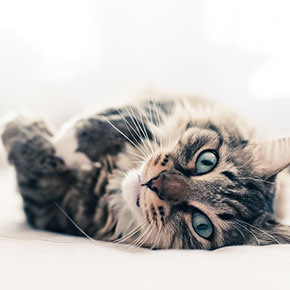
Everything you need to know about cat hay fever in London
April 7, 2018
Beat the hayfever blues
It’s that time of year when all around you people may be complaining of hay fever symptoms – maybe you suffer yourself. But did you know it’s also one of the most common illnesses in cats? Hay fever tends to strike both humans and felines during spring and summer and can cause both distress and misery.
At The Vet Whetstone, we see many cats that suffer with grass or tree pollen allergies. While in humans these mostly affect the sinuses, in cats it’s the skin that mainly suffers – and such allergies can make your pet chronically ill. Fortunately, there’s plenty you can do to help, as the following points show.
If, after reading this, you still have questions, you can always contact us at the practice in Whetstone where the team will be all too happy to offer some advice.
1. What are the symptoms?
While often linked to fleas, excessive licking and scratching can also be caused by an allergic reaction to pollen. This can make your cat’s skin, ears and bottom irritable and itchy. Also, if you notice bald patches around your cat’s lower back, groin, tail or paws, there’s a chance it’s suffering.
2. Ruling out fleas
Check your pet all over for signs of a possible flea infestation so you can rule that out as a cause of the symptoms. Check the fur for flea dirt and make sure you’re up-to-date with treatments. If you use a spot-on product, remember to do it monthly.
3. Treatment
If think your cat may be suffering from hay fever, bring them in to see us so we can run some tests and hopefully pinpoint the problem. Then we can prescribe treatments such as anti-histamines and anti-allergy vaccines.
4. Prevention
As human hay fever sufferers know, it’s tough to avoid pollens. But, as well as anti-allergy injections or natural anti-histamines, evening primrose oil has been proven effective in reducing allergic reactions.
To make sure you’re providing the right type of preventative measures, why not ask us first? We’ll happily advise.